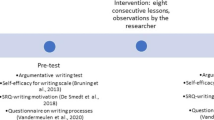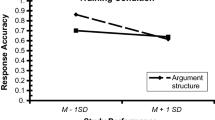Abstract
Graphical representations have long been associated with more efficient problem solving. More recently, researchers have begun looking at how representation may affect the information that students attend to and what they learn. In this paper we report on a study of how graphical representation may influence interaction between a human coach and a student engaged in analyzing argument texts. We compared coaching interaction with subjects working with a predefined graphical representation to subjects who developed their own representation. The predefined representation, with a better “cognitive fit”, to the task, allowed subjects to do more work on their own. Coaching was more systematic and both more efficient and more effective.
Access this chapter
Tax calculation will be finalised at checkout
Purchases are for personal use only
Preview
Unable to display preview. Download preview PDF.
Similar content being viewed by others
References
Cavalli-Sforza, V., Moore, J.D., Suthers, D.D.: Helping students articulate and criticize scientific explanations. In: Brna, P., Ohlsson, S., Pain, H. (eds.): Proceedings of AI-ED 93, World Conference on Artificial Intelligence in Education (1993) 113–120
Suthers, D., Weiner, A, Connelly, J., Paolucci, M.: Belvedere: Engaging students in critical discussions of science and public policy issues. In: Proceedings AI-ED 95, World Conference on Artificial Intelligence in Education (1995)
Suthers, D.D., Cavalli-Sforza, V.: Issues in graphical media for evaluating and debating scientific theories. In: Cox, R., Petre, M., Brna, P., Lee, J. (eds.): Proceedings of the Workshop on Graphical Representations, Reasoning, and Communication. AI-ED 93, World Conference on Artificial Intelligence in Education. (1993) 5–8
Paolucci, M., Suthers, D.D., Weiner, A.: Automated advice-giving strategies for scientific inquiry. In: Frasson, C., Gauthier, G., Lesgold, A. (eds.): Intelligent Tutoring Systems, Third International Conference. Lecture Notes In Computer Science. Springer-Verlag, New York, NY (1996) 372–381
Toth, J.A., Suthers, D.D., Weiner, A.: Providing expert advice in the domain of collaborative scientific inquiry. In: du Boulay, B., Mizoguchi, R. (eds.): Proceedings AI-ED 97, World Conference of the Artificial Intelligence in Education Society. IOS Press, Amsterdam (1997)
Suthers, D.D.: Representational bias as guidance for learning interactions: A research agenda. In: Lajoie, S.P., Vivet, M. (eds.): Proceedings of AI-ED 99, World Conference of the Artificial Intelligence in Education Society IOS Press, Amsterdam (1999) 121–128
Cavalli-Sforza, V.: Constructed vs. received representations for scientific argument: Implications for learning and coaching. In: Proceedings of The Twenty-First Annual Conference of the Cognitive Science Society (1999) 108–113
Pilkington, R.M.: Analyzing educational discourse: The DISCOUNT scheme. Technical Report No. 019703, Computer Based Learning Unit, University of Leeds, Leeds, UK (1997)
Katz, S., O’Donnell, G., Kay, H.: An approach to coding educational dialogues for descriptive and prescriptive purposes. In: Proceedings of the AI-ED 99 Workshop on Analyzing Educational Dialogue Interaction: Towards Models that Support Learning. IOS Press, Amsterdam (1999) 22–32
Pilkington, R.M., Hartley, J.R., Hintze, D.: Learning to argue and arguing to learn: An interface for computer-based dialogue games. Journal of Artificial Intelligence in Education 3(3) (1992) 275–295
Bouwer, A.: ArgueTrack: Computer support for educational argumentation. In: Lajoie, S.P., Vivet M. (eds.): Proceedings of AI-ED 99, World Conference of the Artificial Intelligence in Education Society. IOS Press, Amsterdam (1999) 121–128
Author information
Authors and Affiliations
Editor information
Editors and Affiliations
Rights and permissions
Copyright information
© 2000 Springer-Verlag Berlin Heidelberg
About this paper
Cite this paper
Cavalli-Sforza, V. (2000). The Impact of Representation on Coaching Argument Analysis. In: Gauthier, G., Frasson, C., VanLehn, K. (eds) Intelligent Tutoring Systems. ITS 2000. Lecture Notes in Computer Science, vol 1839. Springer, Berlin, Heidelberg. https://doi.org/10.1007/3-540-45108-0_45
Download citation
DOI: https://doi.org/10.1007/3-540-45108-0_45
Published:
Publisher Name: Springer, Berlin, Heidelberg
Print ISBN: 978-3-540-67655-3
Online ISBN: 978-3-540-45108-2
eBook Packages: Springer Book Archive





